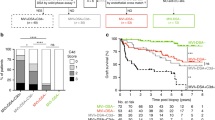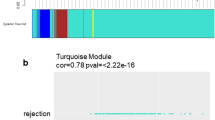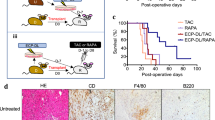Abstract
We investigated the pathogenesis of chronic allograft rejection in mouse cardiac allografts. Long-term survival occurred after administration of monoclonal antibody to CD4 or CD40-ligand (CD40L) plus donor cells. Both treatments induced permanent graft survival, but, in contrast to transplants in mice treated with CD4 monoclonal antibody, grafts in mice treated with CD40L monoclonal antibody lacked evidence of chronic rejection, including transplant arteriosclerosis. Freedom from chronic rejection in the group treated with CD40L monoclonal antibody correlated with vascular expression of the 'protective' genes heme oxygenase-1 (HO-1), Bcl-xL and A20. Moreover, arteriosclerosis was induced in allografts in immunoglobulin-deficient mice by antibody transfer only when the transfer was done before expression of protective genes. A direct role for protective gene expression in endothelial cells was demonstrated by in vitro experiments in which induction of HO-1 or Bcl-xL suppressed alloantibody-stimulated endothelial activation. Finally, induction of HO-1 in vivo protected allografts against chronic injury. These data show a role for protective genes in the prevention of chronic rejection, and indicate new approaches to protect grafts against development of transplant arteriosclerosis.
This is a preview of subscription content, access via your institution
Access options
Subscribe to this journal
Receive 12 print issues and online access
$209.00 per year
only $17.42 per issue
Buy this article
- Purchase on Springer Link
- Instant access to full article PDF
Prices may be subject to local taxes which are calculated during checkout




Similar content being viewed by others
References
Hancock, W.W. et al. Cytokines, adhesion molecules and the pathogenesis of chronic rejection of rat renal allografts. Transplantation 56, 643–650 (1993).
Russell, M.E. et al. Upregulation of cytokines associated with macrophage activation in the Lewis-to-F344 rat transplantation model of chronic cardiac rejection. Transplantation 59, 572– 578 (1995).
Sayegh, M.H. et al. CD28-B7 blockade after alloantigenic challenge in vivo inhibits Th1 cytokines but spares Th2. J. Exp. Med. 181, 1869–1874 (1995).
Hancock, W.W. et al. Costimulatory function and expression of CD40 ligand, CD80, and CD86 in vascularized murine cardiac allograft rejection. Proc. Natl. Acad. Sci. USA 93, 13967–13972 (1996).
Russell, M.E. et al. Chronic cardiac rejection in the LEW to F344 rat model blockade of CD28-B7 costimulation by CTLA4Ig modulates T cell and macrophage activation and attenuates arteriosclerosis. J. Clin. Invest. 97, 833–838 (1996).
Larsen, C.P. et al. CD40-gp39 interactions play a critical role during allograft rejection - suppression of allograft rejection by blockade of the CD40-gp39 pathway. Transplantation. 61, 4– 9 (1996).
Larsen, C.P. et al. Long-term acceptance of skin and cardiac allografts after blocking CD40 and CD28 pathways. Nature 381, 434–438 (1996).
Bach, F.H., Hancock, W.W. & Ferran, C. Protective genes expressed in endothelial cells: A regulatory response to injury. Immunol. Today 18, 483–486 (1997).
Mottram, P.L., Han, W.R., Purcell, L.J., McKenzie, I.F.C. & Hancock, W.W. Increased expression of IL-4 and IL-10 and decreased expression of IL-2 and IFN-γ in long-surviving mouse heart allografts after brief CD4-monoclonal antibody therapy. Transplantation. 59, 559–565 (1995).
Willis, D., Moore, A.R., Frederick, R. & Willoughby, D.A. Heme oxygenase: A novel target for the modulation of the inflammatory response. Nature Med. 2, 87–90 (1996).
Russell, P.S, Chase, C.M. & Colvin, R.B. Alloantibody- and T cell-immunity in the pathogenesis of transplant arteriosclerosis - Lack of progression to sclerotic lesions in B cell-deficient mice. Transplantation. 64, 1531–1536 (1997).
Bach, F.H., Ferran, C., Winkler, H., Candinas, D. & Hancock, W.W. Accommodation of vascularized xenografts: Expression of "protective genes" by donor endothelial cells in a host Th2 cytokine environment. Nature Med. 3, 196–204 (1997).
Bach, F.H., Ferran, C., Soares, M., Winkler, H. & Hancock, W.W. Modification of vascular responses in xenotransplantation: Inflammation and apoptosis. Nature Med. 3, 944–948 (1997).
Hancock, W.W., Tran, T.H. & Kao, J. Induction of protective gene expression within graft endothelial cells as a means to control NFκB activation and development of chronic rejection. Graft 1 (suppl 2), 21– 24 (1998).
Deramaudt, B.M.J.M., Braunstein, S., Remy, P. & Abraham, N.G. Gene transfer of human heme oxygenase into coronary endothelial cells potentially promotes angiogenesis. J. Cell. Biochem. 68, 121– 127 (1998).
Wells, A.D., Walsh, M., Sayegh, M.H. & Turka, L.A. Bcl-xL augments T cell survival in the absence of costimulation and blocks immunosuppression with CTLA4Ig. Transplantation 65, 79 (1998).
Grimm, S., Bauer, M.K.A., Baeuerle, P.A. & Schulzeosthoff, K. Bcl-2 down-regulates the activity of transcription factor NF-κB induced upon apoptosis. J. Cell. Biol. 134, 13– 23 (1996).
Murphy, B., Kim, K.S., Buelow, R., Sayegh, M.H. & Hancock, W.W. Synthetic MHC class I peptide prolongs cardiac survival and attenuates transplant arteriosclerosis in the Lewis->Fischer 344 rat model of chronic allograft rejection. Transplantation 64, 14–19 (1997).
Acknowledgements
Supported by NIH grants AI40152 (W.W.H.) and AI37691 (L.A.T.).
Author information
Authors and Affiliations
Corresponding author
Rights and permissions
About this article
Cite this article
Hancock, W., Buelow, R., Sayegh, M. et al. Antibody-induced transplant arteriosclerosis is prevented by graft expression of anti-oxidant and anti-apoptotic genes. Nat Med 4, 1392–1396 (1998). https://doi.org/10.1038/3982
Received:
Accepted:
Issue Date:
DOI: https://doi.org/10.1038/3982
This article is cited by
-
Donor bone-marrow CXCR4+ Foxp3+ T-regulatory cells are essential for costimulation blockade-induced long-term survival of murine limb transplants
Scientific Reports (2020)
-
Biodegradable Cable-Tie Rapamycin-eluting Stents
Scientific Reports (2017)
-
Glomerulocapillary miRNA response to HLA-class I antibody in vitro and in vivo
Scientific Reports (2017)
-
Histone/protein deacetylase 11 targeting promotes Foxp3+ Treg function
Scientific Reports (2017)
-
Comparison of the influence of ticagrelor and clopidogrel on inflammatory biomarkers and vascular endothelial function for patients with ST-segment elevation myocardial infarction receiving emergency percutaneous coronary intervention: study protocol for a randomized controlled trial
Trials (2016)



